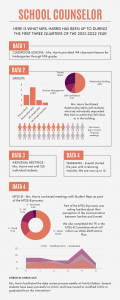Did you know kids 6-12 years old need 9 to 12 hours of sleep per night? That’s a lot! Thinking in my own home, I know sometimes this can seem tricky. This is especially true now that the sun is going down later and later at night! However, sleep is crucial to a student’s success.
According to the CDC, most students do not get enough sleep. This can cause serious impairments to their success.
“Adequate sleep contributes to a student’s overall health and well-being. Students should get the proper amount of sleep at night to help stay focused, improve concentration, and improve academic performance.
Children and adolescents who do not get enough sleep have a higher risk for many health problems, including obesity, type 2 diabetes, poor mental health, and injuries.1-4 They are also more likely to have attention and behavior problems, which can contribute to poor academic performance in school.”
So what can parents and guardians do? Here are some tips:
- Model and encourage habits that help promote good sleep. Setting a regular bedtime and rise time, including on weekends, is recommended for everyone—children, adolescents, and adults alike. students with parent-set bedtimes usually get more sleep than those whose parents do not set bedtimes.
- Dim lighting. Students who are exposed to more light (such as room lighting or from electronics) in the evening are less likely to get enough sleep.
- Implement a media curfew. Technology use (computers, video gaming, or mobile phones) may also contribute to late bedtimes. Parents should consider banning technology use after a certain time or removing these technologies from the bedroom.
See HERE for more information.
